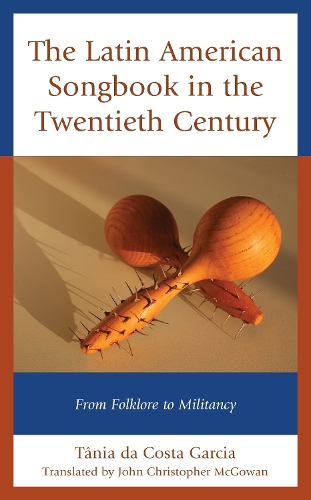
The Latin American Songbook in the Twentieth Century: From Folklore to Militancy
(Hardback)
Publishing Details
The Latin American Songbook in the Twentieth Century: From Folklore to Militancy
By (Author) Tnia da Costa Garcia
Translated by John Christopher McGowan
Bloomsbury Publishing PLC
Lexington Books
27th August 2019
United States
Classifications
Professional and Scholarly
Non Fiction
History of the Americas
782.42163098
Physical Properties
Hardback
186
Width 161mm, Height 229mm, Spine 20mm
454g
Description
The Latin American Songbook in the Twentieth Century: From Folklore to Militancy takes an unprecedented comparative analysis approach to the complex relationship between popular music and culture, society, and politics in Latin America as it relates to representations of national identity. Tnia da Costa Garcia analyzes archival research in Chile, Brazil and Argentina, which have very similar cultural and political processes. This book is divided into two different parts: the first focuses on how the folk studies movement was legitimized in Chile, Brazil, and Argentina; while the second emphasizes the rich history of how the militant song movement in Spanish America was received, transformed, and transmitted to Brazil in the second half of the twentieth century. This book will be especially useful to scholars of Latin American studies, music studies, cultural studies, and history.
Reviews
The Latin American Songbook in the Twentieth Century provides a contextual analysis of musical practices as an expression of identity in Argentina, Chile, and Brazil. Garcia (history and social history, Paulista State Univ., Brazil) sustains her analysis with solid ethnographic and historical data that reveal how and why songs have emerged and their stylistic and functional evolution, as products of specific cultures that define the perimeter within which music evolved. The book is an excellent model of ethnographic and ethnomusicological analysis, and the information it provides reveals the hidden social roles of songs in their respective context, in time and space. Garcia structures the book in two. . . sections. Part 1, "From Folklore to Mass Media," comprises seven chapters devoted to folk music traditions from Argentina, Chile, and Brazil, highlighting the characteristics that identify the songs with their respective country. In part 2, "The Militant Song in Latin America" (two chapters), the author outlines the role of militant songs in various political movements. All this is written in language accessible to all readers. The book closes with a generous reference list.
Summing Up: Recommended. Graduate students, researchers, faculty.
-- "Choice Reviews"Author Bio
Tnia da Costa Garcia is professor and researcher of history and social history at Paulista State University.
